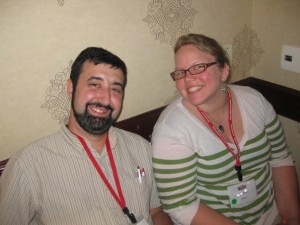Ben and I first met as teenagers at the 1997 National Marfan Foundation conference. The program was small then: just 15 of us. These days he & I co-lead the teen program, which regularly sees 80-100 teens each year.
“Look at those hands!” I’ve been told by my parents that those were the first words I heard after I was born – I know I was there, but you’ll forgive me for not remembering! I was lucky though – as a result of my Mom and Grandfather both having Marfan syndrome, the spindly fingers I carry with me to this day were not really a surprise. In the moments after those words were said, key tests were performed to ensure that this Marfan baby would have a positive start in the world.
Over the last 27 years, since that milestone moment, I’ve looked at my Marfan syndrome in very different ways. I’ve been defiant (“No doctor is gonna tell me what to do. I’m the boss of my own body”), ashamed (“If no one knows, then no one can treat me differently”) and, finally, accepting and even embracing my condition. Throughout, I was always reliant on my family, friends and the National Marfan Foundation (NMF) for guidance, support and all the help I needed.
Besides a support system, I had something very important going for me. As a result of the fact that I had been diagnosed at birth, I was always followed very carefully by my doctors. Each medical issue that arose – small or large – was treated with exceptional care and concern to ensure it didn’t become something worse. Without the awareness of my condition that an early diagnosis made possible, I would not have been as well-equipped to make the best decisions about activities and be as effectively monitored. Without that, there is no way I would be as healthy as I am today.
Thanks to the NMF I know there is a group of people – doctors, parents, kids, counselors – friends who are there for me and my fellow “Marfs.” I know that all of living with Marfan syndrome and related disorders have hope for a better future. I know that, should my kids have those same spindly fingers that their Dad has, their life will still be filled with numerous wonderful possibilities. The NMF helped “teenage” Ben recognize that he was not alone. The NMF has helped “adult” Ben live a healthy and productive life.
If all the NMF did was save lives, that would still be extraordinary. But, for this community, that is not enough. If we are going to live longer, we also have to live better. Early diagnosis is step one, but all those in this exceptional community work tirelessly to ensure that a diagnosis is not the end of the journey, but a new beginning. And sometimes, as I’ve found in my life, those new beginnings lead to beautiful discoveries and a life truly worth living.
Please, support the NMF by casting a vote for them in the Chase Community Giving Campaign. Any money won will go to support programs that promote early diagnosis.


2 Comments
Leave a reply →